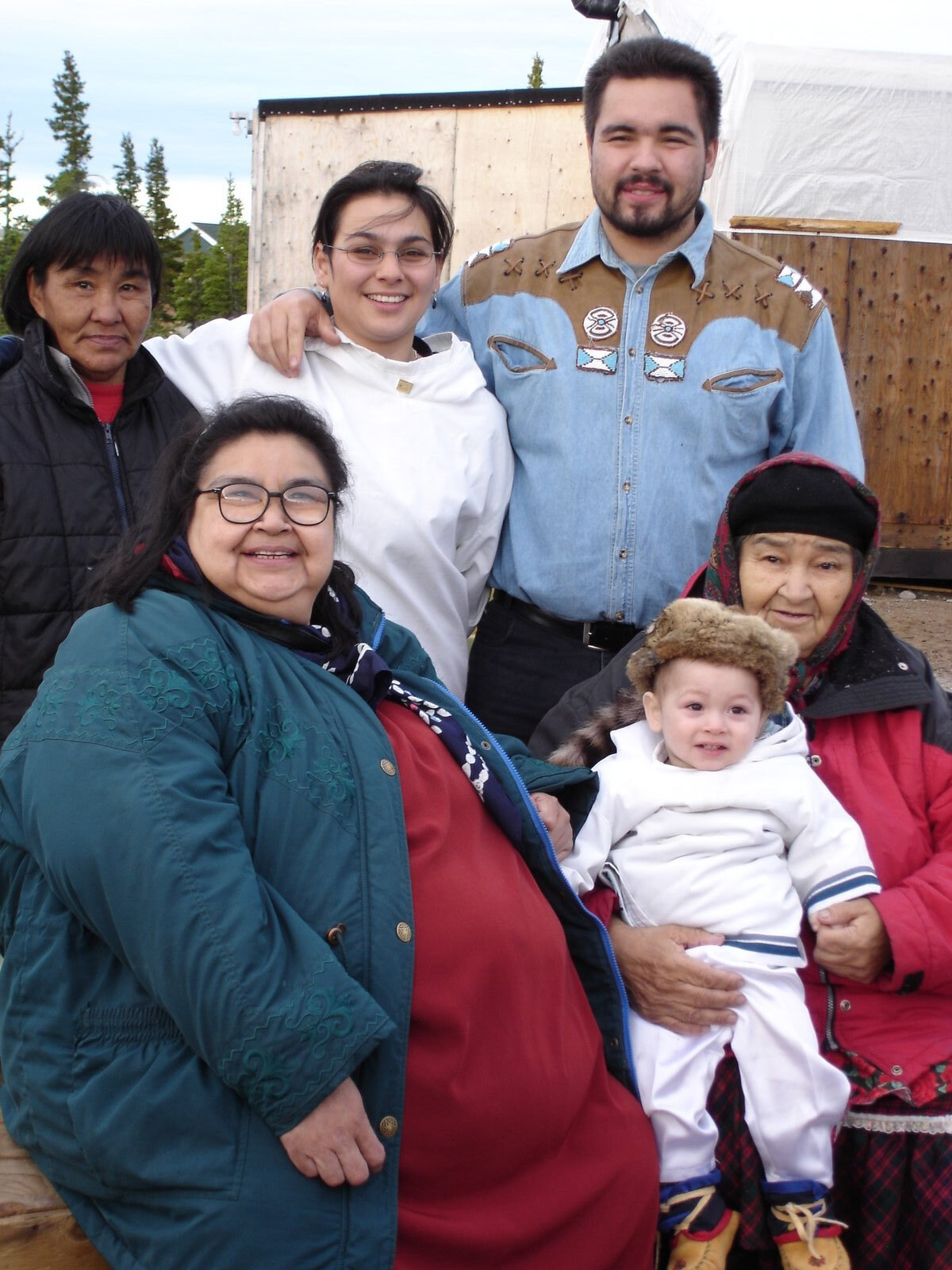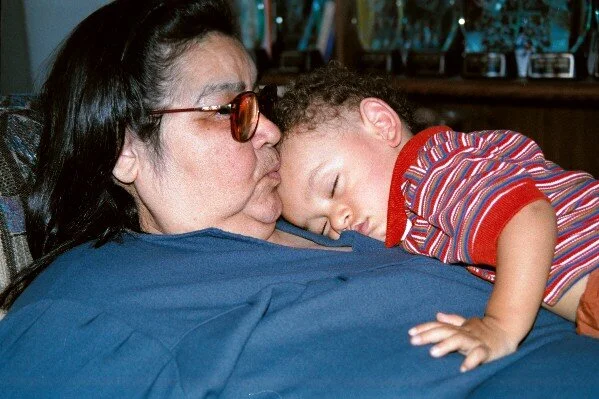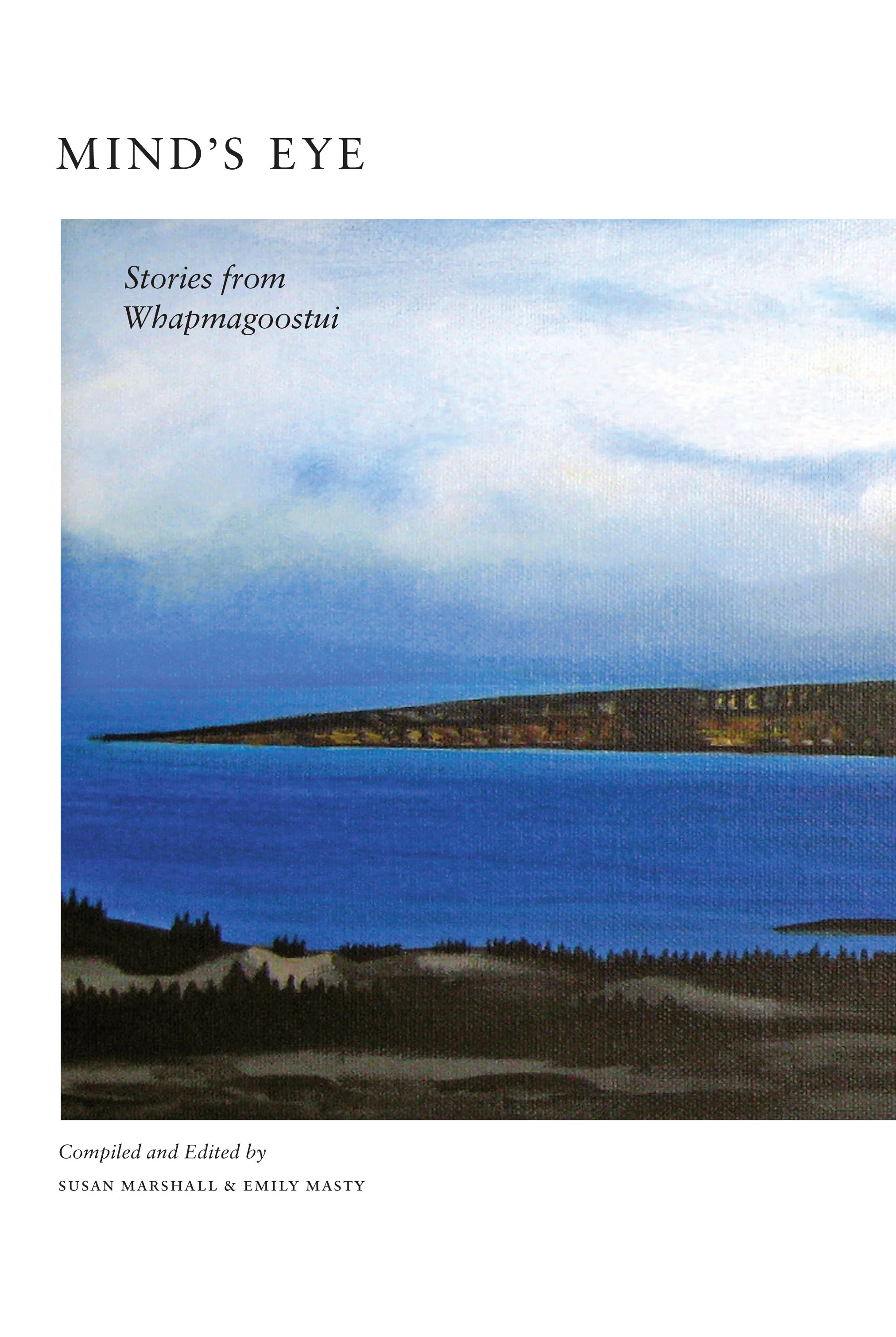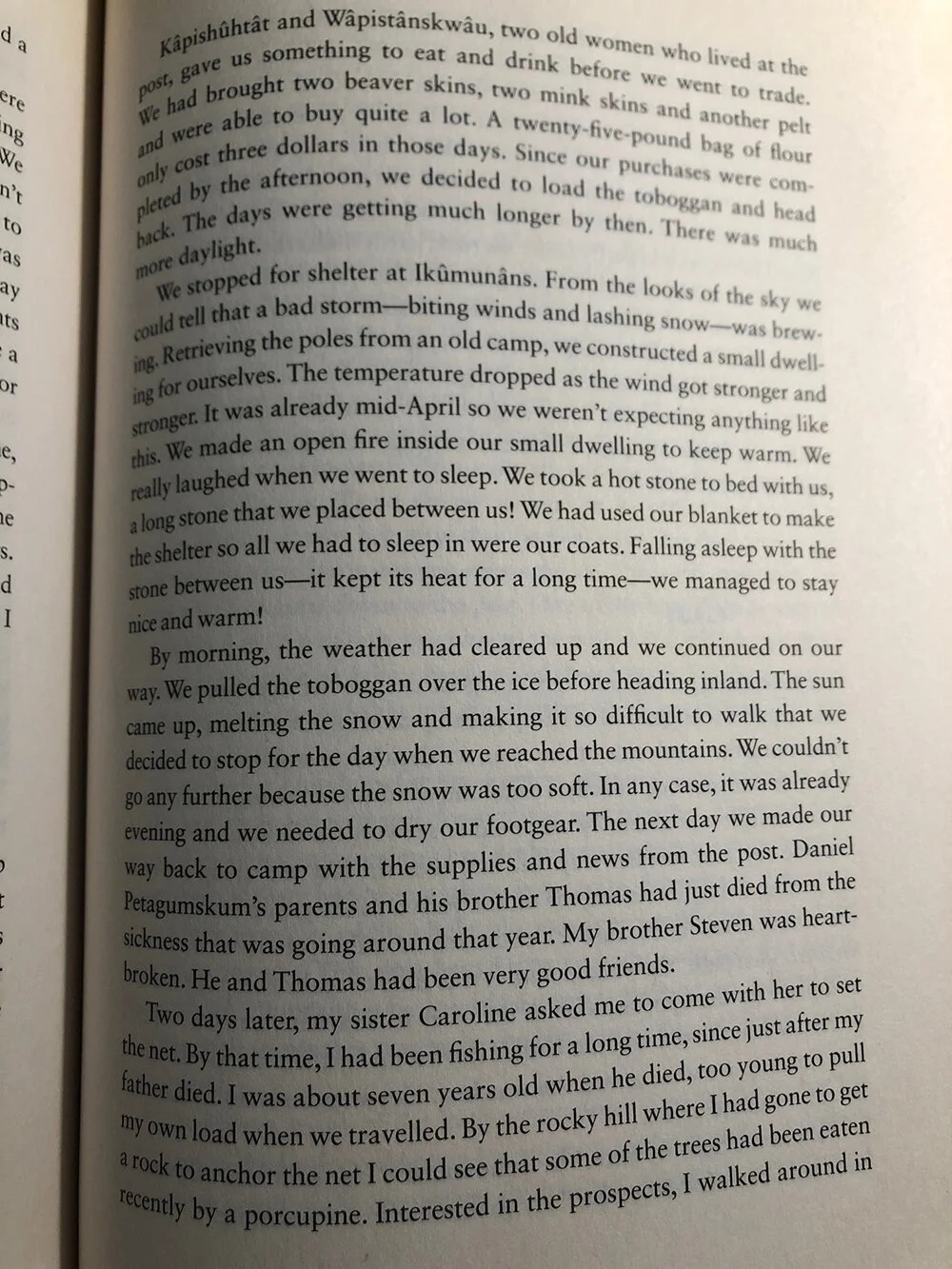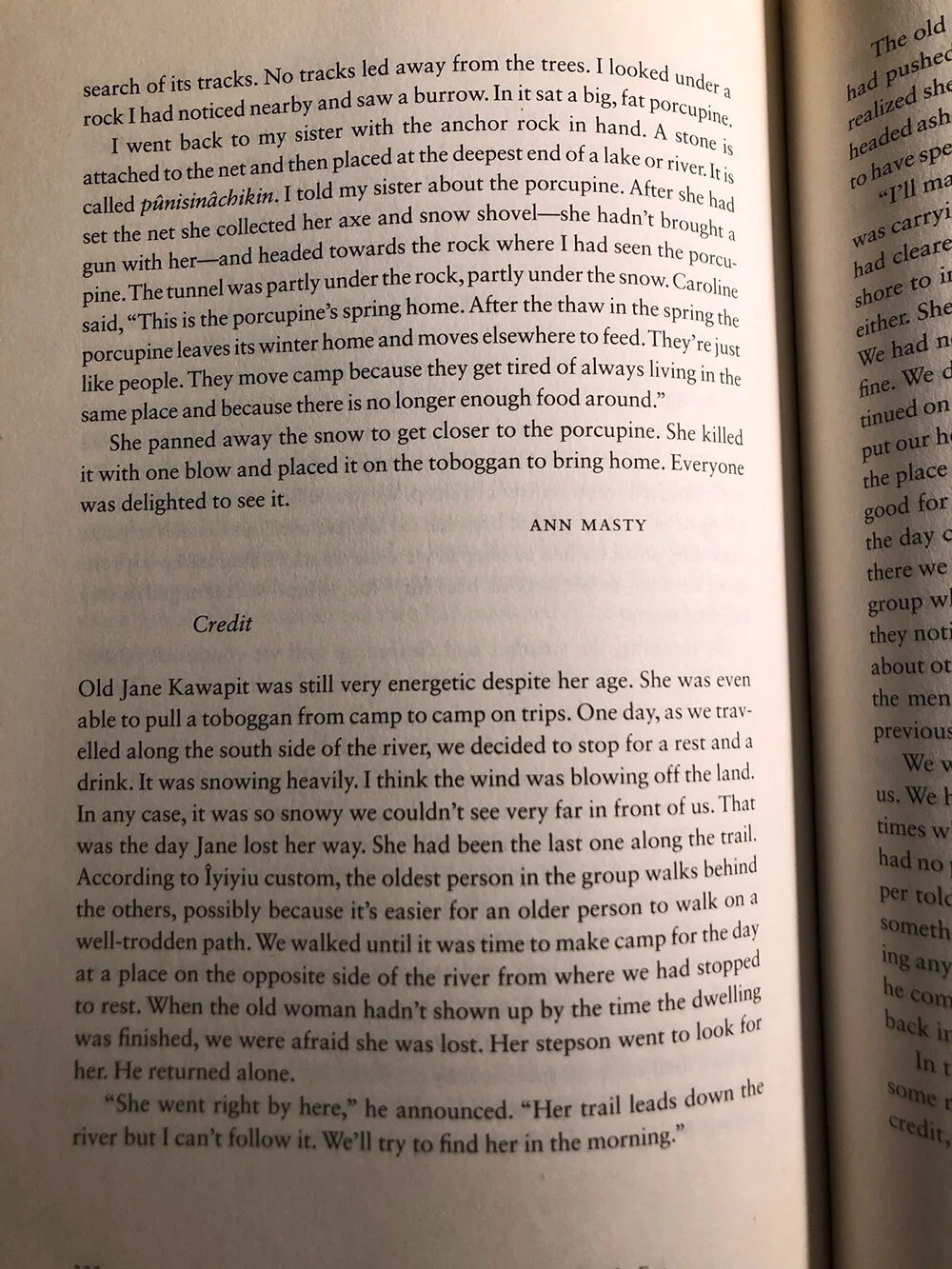Mind’s Eye: Stories from Whapmagoostui
At once historical, mystical and poignant, Mind’s Eye documents the stories told by eighteen Cree elders in Whapmagoostui, a mixed community of Cree, Inuit, and non-Natives, located on the eastern shore of Hudson Bay at the mouth of the Great Whale River in northern Quebec.
Recorded from the mid-1970s to the mid-1990s, the stories were told against the backdrop of proposed hydroelectric development on the Great Whale River and Little Whale River that would threaten the health, livelihood and culture of the Cree and Inuit communities in the region. (From the distributor’s website)
Mind’s Eye, a unique stage production of the book toured the Cree communities in 2014. Read the news article about the stage production here.
Read two excerpts, by Ann Masty, Emily’s late mother, from Mind’s Eye below:
Click here to purchase Mind’s Eye
Published by
Aanischaaukamikw Cree Cultural Institute
205 Opemiska Meskino
C.P. 1160
Oujé-Bougoumou, QC
G0W 3C0
Copyright © 2013
Cree Regional Authority and Whapmagoostui First Nation
Storytellers: Sam Atchynia, Nellie Atchynia, Frankie Dick, Matthew George, Rupert George, John Kawapit, Suzanne Kawapit, William Kawapit, Noah Mamianskum, Ann Masty, Sam Masty, Samson Masty, Hanna Natachequan, Andrew Natachequan, Philip Natachequan, Joseph Rupert, Maggie Sandy, Peter Sandy, Ronnie Sheshamush
Story collection, research, translation, writing and editing were carried out under the auspices of the Cree Regional Authority and the Whapmagoostui First Nation. The Cree Regional Authority and the acknowledges the financial support of the Ministère de la Culture et des Communications, the Cree Regional Authority Board of Compensation and the Whapmagoostui First Nation.
The Day Father Died
I remember the day my father died. I was only six at the time. They still carried me on top of the toboggan for part of the way on long trips. We had just gone inland from Mâtâwâu, north of the Great Whale River. My brother carried my father from the post to the cove after the first point. We then paddled from there to Mâtâwâu. My brother carried my father over all the portages on our trip inland.
There were no clinics at the time [1935], the only medical person here being the manager. My father had tuberculosis. The manager told us that he was going to die soon, that all we could do was look after him as best we could. I remember being very sad. I used to cry a lot. On that last trip inland with him, my mother used to feed him a soup she made from fish and from the lichens that grew on rocks. She mashed the lichens and blended them with the fish to make a soup. This was the only thing he was able to eat.
We stayed in a beautiful place blanketed in white caribou moss. There was plenty of firewood around. Upon arriving there, my brothers Steven and Ronnie and sister Edith went off to check the nets. Edith steered the canoe while the boys handled the nets. Caroline and my mother made the dwelling and I sat with my father. He slept soundly. We stayed here for two days while my mother smoked the fish on a little platform over the fire. They were so big, she had to handle each one individually!
We moved on to a place called Ânâtwâyâch. This lake always had fish. My father died here. Upon arriving at Ânâtwâyâch, my mother made a fire to warm some broth for him. He fell asleep while she was doing this. Suddenly, while still asleep, he pushed his blankets aside and sat right up. He hadn’t sat up on his own for a long time. My mother tried to restrain him because, from the looks of how he was moving, he was about to stand up.
Holding him in her arms, she asked him what was the matter. “There’s nothing wrong,” he responded. “I’ve just had a dream.” And he went on to describe his dream. He said that dreamt two angels were in front of him, angels that had come for him. They were so bright, they outshone the sun. Wanting to go with them, he was about to get up and leave. He died that night.
I was too young to be of much help. Steven, Caroline and Edith did all the necessary things. Steven measured my father and cut trees from which to make planks. Two planks were placed at the bottom of the grave, an additional two on top of him. They then put earth on top and filled up the grave. We left that place after we had placed a cross with his name on it on top of the grave. That’s how we buried him. I was too young to understand about death and refused to leave my father behind even though he was buried. I kept asking why we were leaving father behind. I had to be carried to the canoe and placed inside it by my brother Steven. I was told I was making a big scene. It was up to my mother to teach me everything I know because I was so young when my father died.
Sleeping with a Warm Rock
When I was young, girls did hard work, just like the boys. Agnes, Philip Natachequan’s wife, and I used to be the ones to make the trips to the post in the spring, when it was not too cold. On one of our trips, when I was about sixteen, all we brought with us was a small piece of dwelling cover and a blanket,. During the day, the dwelling cover was used to wrap the supplies on the toboggan. We left for the post on beautiful day, knowing that we would sleep somewhere along the way. We had been told to make a dwelling on exposed ground, from small trees. We spent the night at Âpâskûhskâsich, so called because of the mounds of earth there, and left for the post bight and early the next morning. We arrived soon after.
Kâpishûhtât and Wâpistânskwâu, two old women who lived at the post, gave us something to eat and drink before we went to trade. We had brought two beaver skins, two mink skins and another pelt and were able to buy quite a lot. A twenty-five pound bag of flour only cost three dollars in those days. Since our purchases were completed by the afternoon, we decided to load the toboggan and head back. The days were getting much longer by then. There was much more daylight.
We stopped for shelter at Ikûkmunâns. From the looks of the sky we could tell that a bad storm—biting winds and lashing snow—was brewing. Retrieving the poles from an old camp, we constructed a small dwelling for ourselves. The temperature dropped as the wind got stronger and stronger. It was already mid-April so we weren’t expecting anything like this. We made an open fire inside our small dwelling to keep warm. We really laughed when we went to sleep. We took a hot stone to bed with us, a long stone that we placed between us! We had used our blanket to make the shelter so all we had to sleep in was our coats. Falling asleep with the stone between us—it kept its heat for a long time—we managed to stay nice and warm!
By morning, the weather had cleared up and we continued on our way. We pulled the toboggan over the ice before heading inland. The sun came up, melting the snow and making it so difficult to walk that we decided to stop for the day when we reached the mountains. We couldn’t get any further because the snow was too soft. In any case, it was already evening and we needed to dry our footgear. The next day we made our way back to camp with the supplies and news from the post. Daniel Petagumskum’s parents and his brother Thomas had just died from the sickness that was going around that year. My brother Steven was heartbroken. He and Thomas had been very good friends.
Two days later, my sister Caroline asked me to come with her to set the net. By that time, I had been fishing for a long time, since just after my father died. I was about seven years old when he died, too young to pull my own load when we travelled. By the rocky hill where I had gone to get a rock to anchor the net I could see that some of the trees had been eaten recently by a porcupine. Interested by the prospects, I walked around in search of its tracks. No tracks led away from the trees. I looked under a rock I had noticed nearby and saw a burrow. In it sat a big, fat porcupine.
I went back to my sister with the anchor rock in hand. A stone is attached to the net and then placed at the deepest end of a lake or river. It is called pûnisinâchikin. I told my sister about the porcupine. After she had set the net she collected her axe and snow shovel—she hadn’t brought a gun with her—and headed towards the rock where I had seen the porcupine. The tunnel was partly under the rock, partly under the snow. Caroline said, “This is the porcupine’s spring home. After the thaw in the spring the porcupine leaves its winter home and moves elsewhere to feed. They’re just like people. They move camp because they get tired of always living in the same place and because there is no longer enough food around.”
She panned away the snow to get closer to the porcupine. She killed it with one blow and placed it on the toboggan to bring him. Everyone was delighted to see it.

